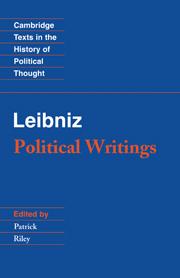Book contents
- Frontmatter
- Contents
- Preface to the Second Edition
- Abbreviations
- Introduction
- Part I On Justice and Natural Law
- Part II On Social Life, Enlightenment and the Rule of Princes
- Part III On State-Sovereignty and Hobbesian Ideas
- Part IV On the Defense of Hapsburg Europe against France
- Part V On International Relations and International Law
- Part VI Political Letters
- Part VII Sovereignty and Divinity: Unpublished Manuscripts, 1695–1714
- 15 An Unpublished Manuscript of Leibniz on the Allegiance Due to Sovereign Powers (1695)
- 16 Leibniz' Unpublished Remarks on Abbé Bucquoi: Divinity and Sovereignty (1711)
- 17 An Unpublished Lecture by Leibniz on the Greeks as Founders of Rational Theology: Its Relation to His ‘Universal Jurisprudence’ (1714)
- Critical Bibliography
- Index
16 - Leibniz' Unpublished Remarks on Abbé Bucquoi: Divinity and Sovereignty (1711)
Published online by Cambridge University Press: 05 June 2012
- Frontmatter
- Contents
- Preface to the Second Edition
- Abbreviations
- Introduction
- Part I On Justice and Natural Law
- Part II On Social Life, Enlightenment and the Rule of Princes
- Part III On State-Sovereignty and Hobbesian Ideas
- Part IV On the Defense of Hapsburg Europe against France
- Part V On International Relations and International Law
- Part VI Political Letters
- Part VII Sovereignty and Divinity: Unpublished Manuscripts, 1695–1714
- 15 An Unpublished Manuscript of Leibniz on the Allegiance Due to Sovereign Powers (1695)
- 16 Leibniz' Unpublished Remarks on Abbé Bucquoi: Divinity and Sovereignty (1711)
- 17 An Unpublished Lecture by Leibniz on the Greeks as Founders of Rational Theology: Its Relation to His ‘Universal Jurisprudence’ (1714)
- Critical Bibliography
- Index
Summary
Leibniz' critical remarks on the Abbé Bucquoi's Pensées sur l'Existence de Dieu – written in November 1711, between the publication of his Essais de Theodicée (1710) and his departure for the final visit to Vienna (1712) that yielded the Monadology and the Principles of Nature and Grace – are published here by generous permission of the Niedersächsische Landesbibliothek, Hanover.
They do not change our view of Leibniz' philosophy; but they do throw a little additional light on his doubts about Descartes' version of the ontological proof of the existence of God. They also provide an opportunity to recall some of the facts about the existence of the Abbé Bucquoi – one of the liveliest philosophical adventurers of Leibniz' day. But above all they show that Leibniz tried to discover a ‘universal’ idea of sovereignty that would work equally well in describing the sovereign perfection of God, the ‘sovereign’ perfection of geometrical figures and the (imperfect) sovereignty of mere earthly rulers. That demi-Platonic linking up of theology, geometry and politics – reminiscent of Meno, Euthyphro and Republic – constitutes half of Leibniz' practical thought; the other half is a ‘charity’ descended directly from St Paul.
Jean-Albert d'Archambaud, Comte de Bucquoi, ‘a fait du bruit’ – as the Biographie Universelle (1812) radically understates the matter – ‘par la singularité des ses aventures’.
- Type
- Chapter
- Information
- Leibniz: Political Writings , pp. 217 - 225Publisher: Cambridge University PressPrint publication year: 1988



